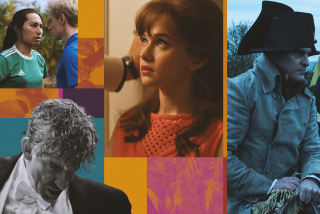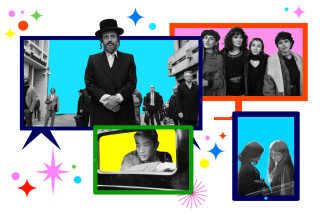WORTHY FINISH IN CHINESE FILM SERIES
- Share via
“Electric Shadows,” the Four Star Theater’s remarkable series of pre-revolutionary Chinese films, concludes with three pictures, each of which is as noteworthy as it is distinctive.
Fang Hung’s “Bell Ringing on Cold Mountain” (1949), which screens tonight and also Tuesday along with a repeat of the impressive “Women Walk Together,” is the least of the three artistically, but it’s revealing as a high water mark of Hollywood’s influence on the Chinese cinema on the eve of the Communist takeover. The shadow of ‘40s Hollywood looms large not only over the plot but also in the largely Western decor, hair styles and costumes. This highly melodramatic romance turns upon a husband’s shocked discovery that his wife (Sha-fei) is the lost love of his much married old friend (Gao Bo). What sets this heady tale apart from its Hollywood counterparts is its awkward framing story; by having a wise old priest in traditional garb serve as the film’s narrator, writer Sun Mun would seem to be trying to ensure sympathy for the ill-fated Sha-fei.
The 1947 “Night Shop” (Tuesday and Wednesday) is director Wan Tso-Lin’s and writer Ko Ling’s masterful adaptation of Gorky’s “Lower Depths,” superbly performed. An excellent print shows to full advantage the film’s fine atmospheric use of light and shadow as we’re plunged into society’s lowest realms. Among those struggling to survive in the seediest of tenements is a young thief (Chang Fa) of essentially decent instincts and a pretty girl (Chow Hsueh) at the cruel mercy of her ruthless, jealous older sister (Tung Chih Ling), the wife of the tenement’s greedy landlord. If ever there were a precursor to revolution it’s “Night Shop.”
“Fishermen’s Song” (Wednesday), Tsai Chu-sheng’s exquisite and popular 1934 silent fable of poverty and wealth, tells of a brother (Yuen Tzung-mei of “The Highway”) and sister (Wang Ren-mei), twin offspring of the widow of an impoverished fisherman, and the rich young man (Tan Ying) with whom they grow up. Although shot silent, “Fishermen’s Song,” which has moments that could have been inspired by Griffith, has a sound-effects track and a score (which has as its major theme “Ave Maria”) and culminates with the singing of the lovely title song, which will probably be well-remembered by older Chinese audiences. For show times: (213) 936-3533, 747-4794.
UCLA’s Film Archives launches its Thursday 8 p.m. Melnitz Theater series Hollywood Freaks: The Horror and Romance of James Whale and Tod Browning, with an inevitable twinning of Whale’s “Frankenstein” (1931) and Browning’s “Dracula” (1931), which remain diverting rather than frightening. The briskly paced “Frankenstein” is by far the more satisfying of the two Universal horror classics, with Boris Karloff’s man-made monster timeless in his poignancy. “Dracula,” in contrast, suffers from a poor script, a deservedly forgotten supporting cast and a stately pace better suited to silent films. But it does have Bela Lugosi, suavely sinister in the title role, dramatic sets and Karl Freund’s superb photography.
Jean Renoir’s “French Cancan” (1955), his lavish and highly personal expression of love for the theater, is back Sunday at the Nuart for a week, but this time it’s longer by 12 minutes. In this fictionalized account of the founding of the Moulin Rouge, Jean Gabin plays a high-living and visionary Paris music hall proprietor who transforms vivacious laundress Francoise Arnoul into a high-kicking sensation--much to the wrath of fiery, jealous belly dancer Maria Felix. The film climaxes with a long and exuberant cancan.
More to Read
Only good movies
Get the Indie Focus newsletter, Mark Olsen's weekly guide to the world of cinema.
You may occasionally receive promotional content from the Los Angeles Times.










